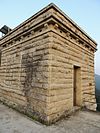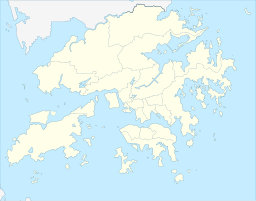Tai Tam Reservoirs
| Tai Tam Reservoirs | |
|---|---|
 Tai Tam Upper Reservoir in July 2010 | |
| Location | Hong Kong |
| Coordinates | 22°16′N 114°13′E / 22.26°N 114.21°E |
| Lake type | reservoir |
| Tai Tam Reservoirs | |||||||||||||
|---|---|---|---|---|---|---|---|---|---|---|---|---|---|
| Traditional Chinese | 大潭水塘 | ||||||||||||
| |||||||||||||
The Tai Tam Reservoirs, also known as Tai Tam Reservoir Group, is a group of reservoirs located in the Tai Tam Country Park in the eastern part of Hong Kong Island in Hong Kong. The four reservoirs have a total storage capacity of 6.2 million cubic metres. They are managed by the Water Supplies Department of the Hong Kong Government.
The reservoirs consist of:
- Tai Tam Upper Reservoir (大潭上水塘), 22°15′36″N 114°12′36″E / 22.260°N 114.210°E
- Tai Tam Byewash Reservoir (大潭副水塘),
- Tai Tam Intermediate Reservoir (大潭中水塘) 22°14′46″N 114°12′36″E / 22.246°N 114.210°E and
- Tai Tam Tuk Reservoir (大潭篤水塘) 22°14′35″N 114°13′12″E / 22.243°N 114.220°E.
The upper and byewash reservoirs are jointly known as Tai Tam Reservoir (大潭水塘).
Geography
[edit]The reservoirs are surrounded by Mount Butler (畢拿山), Jardine's Lookout, Violet Hill and Mount Parker, with an extraordinary environment of peace and quiet.
History
[edit]The planning of the reservoirs is known as the Tai Tam scheme, which was started early in 1872 and was shelved in 1874 because of economic depression. The scheme was continued later in 1882 and virtually completed in 1888. Yet again, the supply was proved insufficient and the building of the Tai Tam Tuk dam began in 1912.
Tai Tam Tuk Reservoir
[edit]As part of the Tai Tam scheme, the UK colonial government commenced the construction of Tai Tam Tuk Reservoir in 1912. The project was completed in 1917, cost 2.46 million Hong Kong dollars[1] and had a 1.42-billion-gallon capacity upon completion. The dam, designed by Daniel Jaffe, was 60-feet tall and 800-feet wide. Twelve arches supported by half-round granite columns were also built to prop up the Tai Tam Road connecting Stanley and Chai Wan.[2] Governor Henry May officially announced the completion of the reservoir on 2 February 1918,[3] and the reservoir continues to operate today.
Conservation
[edit]Heritage Trail
[edit]In September 2009, the Tai Tam Waterworks Heritage Trail was opened, covering the architectural landmarks of the reservoir system. Placards describe the features, giving insights into the work involved in the construction of what the source of most of Hong Kong Island's fresh water supply.
Declared Monuments
[edit]Twenty-two facilities surrounding Tai Tam Tuk reservoir were declared as monuments in 2009,[4][5] including pumping stations, masonry bridges, the memorial stone, the value house and the dam itself.[6][7]
A list of the facilities declared Monument:
| Name of Structure | Photo | Year Built | Location | Note | Reference |
|---|---|---|---|---|---|
| Tai Tam Upper Reservoir Masonry Bridge | 
|
1888 | Tai Tam Upper Reservoir | Declared Monument in 2009 | [8][9] |
| Tai Tam Upper Reservoir Masonry Aqueduct | 
|
1888 | Tai Tam Upper Reservoir | Declared Monument in 2009 | [8][9] |
| Tai Tam Upper Reservoir Dam | 
|
1888 | Tai Tam Upper Reservoir | Declared Monument in 2009 | [8][9] |
| Tai Tam Upper Reservoir Valve House | 
|
1904 | Tai Tam Upper Reservoir | Declared Monument in 2009 | [8][9] |
| Tai Tam Upper Reservoir Tunnel Inlet and Recorder House | 1888 & 1917 | Tai Tam Upper Reservoir | Declared Monument in 2009 | [8][9] | |
| Tai Tam Byewash Reservoir Valve House | 
|
1904 | Tai Tam Byewash Reservoir | Declared Monument in 2009 | [8][9] |
| Tai Tam Byewash Reservoir Dam | 
|
1904 - 1907 | Tai Tam Byewash Reservoir | Declared Monument in 2009 | [8][9] |
| Tai Tam Intermediate Reservoir Dam | 
|
1904 - 1907 | Tai Tam Intermediate Reservoir | Declared Monument in 2009 | [8][9] |
| Tai Tam Intermediate Reservoir Valve House | 
|
1904 - 1907 | Tai Tam Intermediate Reservoir | Declared Monument in 2009 | [8][9] |
| Tai Tam Tuk Reservoir's Four Masonry Bridges | 
|
1907 | Tai Tam Tuk Reservoir | Declared Monument in 2009 | [8][9] |
| Tai Tam Tuk Reservoir Dam | 
|
1912 - 1917 | Tai Tam Tuk Reservoir | Declared Monument in 2009 | [8][9] |
| Tai Tam Tuk Reservoir Valve House | 
|
1917 | Tai Tam Tuk Reservoir | Declared Monument in 2009 | [8][9] |
| Tai Tam Tuk Reservoir Memorial Stone | 
|
1918 | Tai Tam Tuk Reservoir | Declared Monument in 2009 | [8][9] |
| Tai Tam Tuk Raw Water Pumping Station Staff Quarters | 
|
1907 | Tai Tam Tuk Raw Water Pumping Station | Declared Monument in 2009 | [8][9] |
| Tai Tam Tuk Raw Water Pumping Station No. 2 Staff Quarters | 
|
1936 | Tai Tam Tuk Raw Water Pumping Station | Declared Monument in 2009 | [8][9] |
| Tai Tam Tuk Raw Water Pumping Station | 
|
1907 | Tai Tam Tuk Raw Water Pumping Station | Declared Monument in 2009 | [8][9] |
| Tai Tam Tuk Raw Water Pumping Station Chimney Shaft and its Flue | 
|
1907 | Tai Tam Tuk Raw Water Pumping Station | Declared Monument in 2009 | [8][9] |
| Tai Tam Tuk Raw Water Pumping Station Senior Staff Quarters | 
|
1907 | Tai Tam Tuk Raw Water Pumping Station | Declared Monument in 2009 | [8][9] |
Transportation
[edit]A restricted road, Tai Tam Reservoir Road, links reservoirs from Wong Nai Chung Gap to Tai Tam.
References
[edit]- ^ "Hong Kong Blue Book v.1917" (PDF). Retrieved 7 March 2019.
- ^ "Tai Tam Waterworks Heritage Trail" (PDF). Water Supplies Department. Retrieved 7 March 2019.
- ^ "The memorial stone of Tai Tam Tuk Reservoir". Retrieved 7 March 2019.
- ^ "2009 年古物及古蹟 ( 古蹟的宣布 ) 公告". Hong Kong Government. Retrieved 7 March 2019.
- ^ "Declared Monuments in Hong Kong - Hong Kong Island". Antiquities and Monuments Office of Hong Kong. Archived from the original on 5 October 2021.
- ^ "Declared monuments in Hong Kong". Antiquities and monuments office. Archived from the original on 5 October 2021. Retrieved 7 March 2019.
- ^ "Tai Tam Tuk Reservoir". David Bellis. Retrieved 7 March 2019.
- ^ a b c d e f g h i j k l m n o p q r 「1444幢歷史建築物名單和評估結果 Archived 18 June 2018 at the Wayback Machine」古物諮詢委員會
- ^ a b c d e f g h i j k l m n o p q r 四十一項水務設施列法定古蹟,香港特區政府新聞公報,2009年9月18日
External links
[edit]- Water Supplies Department, Hong Kong
- Tai Tam Country Park (in Chinese)

